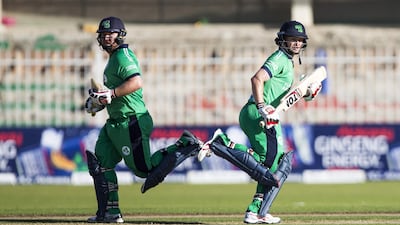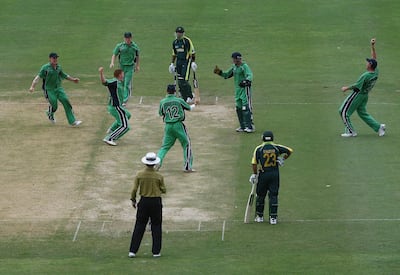Given that Test cricket is, according to most accounts, dying this feels like an important week.
An 11th side will get a chance to play cricket’s oldest and longest format for the first time when Ireland host Pakistan in a leafy Dublin suburb, starting on Friday.
For so long now the death of the Test game has been foretold. Increasingly accepted wisdom says that if it does carry on in any form in the future, it will be just the three sides – India, England and Australia – that bother with it.
And yet, despite the warnings, the club is expanding, first with the introduction of Ireland, and then next month that of Afghanistan, who will play India.
In times past, playing a Test match was regarded as the ideal for any serious, aspiring cricket nation. It certainly was when Ireland really started their international journey by beating – appropriately – Pakistan at the 2007 World Cup in Jamaica.
Now? Cricket’s landscape has altered so vastly in recent years that it is questionable whether it still remains the ultimate priority. Be a Full Member of the ICC, sure. The funding that unlocks is transformative. Around 50 per cent of Cricket Ireland’s annual turnover of €9.3 million (Dh40.5m) is now income from ICC.
But the other formats suit the modern day far more neatly, and are more lucrative, too. Take the Malahide Test, for instance. It is reportedly costing around €1m (Dh4.35m) to stage. It will be a loss leader, with only around half of that figure expected to be recouped via ticket sales and other income.
The expense will be offset by the revenues brought in by Ireland hosting two Twenty20 internationals against India later this summer. On the back of that, Cricket Ireland have been able to secure the largest broadcast rights package in their history.
Part of the deal, which will bring in a reported €1.8m, will see the free-to-air national broadcaster show a one-hour highlights programme every night of the Test.
“This broadcast package is set to break Irish sporting records,” Warren Deutrom, Cricket Ireland’s chief executive, was quoted as saying on their website.
“We anticipate the T20I series against India alone will be the biggest worldwide TV audience of any event – sporting or otherwise - ever staged in Ireland.
“Revenues have certainly increased, but so too have costs of staging the events. We are essentially building a pop-up cricket stadium on a greenfield site, but we understand we have to take risks if we are to compete with the big beasts of the GAA, rugby and football.
“This summer pushes us forward as an organisation and as a sport. It is a real investment in making cricket a mainstream sport in Ireland.”
____________
Read more from Paul Radley:
Niall O’Brien full of belief as Ireland make long-awaited Test debut against Pakistan
10@10 podcast: Cricket's importance in the UAE with David East
'Big loss' for Pakistan as leg-spinner Yasir Shah ruled out of Ireland and England tours
____________
UAE have played against Ireland in three one-day internationals so far this year. Having the right to stage those matches is a privilege that also brings with it extra funding, but the actual cost of staging ODI matches is a burden that is sometimes difficult to bear. As such, few actually get played here.
Test cricket is even more so. The powers that be here seem lukewarm on the idea they can follow the likes of Ireland and Afghanistan into the five-day mode any time soon, suggesting it should be something to aspire to in the future “providing it is commercially sustainable”.
“The whole game is changing significantly globally at the moment,” David East, the chief executive of Emirates Cricket Board, said.
“There is the question mark over whether Test cricket will continue. If it does continue, why wouldn’t our aspiration be to become a Test nation in due course?
“We have ODI status, we have T20I status. Provided it can be commercially sustainable, playing Test cricket in the future should be at least an ambition for us, and something we could work to.”
And yet, despite the financial challenges, getting a first Test cap is going to represent the fulfilment of a long-held ambition for all the players involved.
In 2013, Niall O’Brien said it was his dream to play Test cricket, but that it was unlikely to happen in his playing days. Now, age 36, his chance has come.
“I’m not sure it’s mission accomplished as such, but it has always been a dream to play Test cricket,” O’Brien said.
“It is a dream come true. When I did that interview in 2013, I didn’t realistically think it would happen in my playing career.
“I am obviously delighted the board were able to do all the hard work to get us to where we wanted to. The players and coaching staff have done a lot of hard work, so we are delighted we are on the brink of it.
“We want to perform. It is all well and good playing, but we want to play well.”



